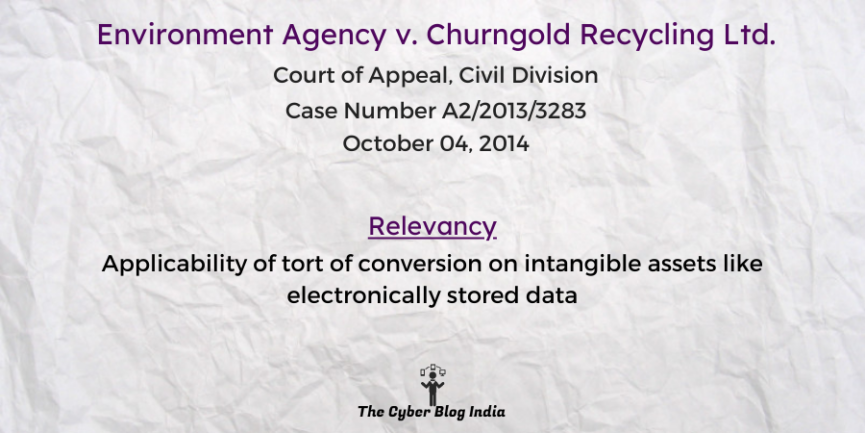Environment Agency v. Churngold Recycling Ltd.

Environment Agency v. Churngold Recycling Ltd.
[2014] EWCA Civ 909
In the Court of Appeal, Civil Division
Case Number A2/2013/3283
Before Lord Justice Moses, Lady Justice Gloster and Lord Justice Vos
Decided on October 04, 2014
Relevancy of the case: Applicability of tort of conversion on intangible assets like electronically stored data
Statutes and Provisions Involved
- The Environment Act 1995 (Section 108)
- The Torts (Interference with Goods) Act 1977 (Sections 4, 14)
Relevant Facts of the Case
- The Environment Agency sought warrants from the Bristol Magistrates Court under Section 108 of the Environment Act 1995. The court issued the warrants for a criminal investigation for the removal of hazardous waste.
- Under the purported exercise of its powers, it collected electronically held information and scanned paper documents available at the respondent’s premises.
- The respondent alleged conversion due to unlawful seizure and retention of documents and sought an immediate interlocutory application for their return. A compromise agreement allowed the respondent access to scanned and digital copies of the seized materials, with specific arrangements for items under legal professional privilege.
- The respondent later argued that some materials were not “records” under section 108(4)(k) of the Environment Act 1995. The Agency challenged this and sought to retain and use the copies for investigation.
- The Bristol Mercantile Court held that the Agency was not entitled to retain the copies. The court had the power to order its return on the assumption of unlawful seizure.
Prominent Arguments by the Counsels
- The appellant’s counsel argued that the Agency, the owner of the digital copies, could not have interfered with its ownership.
- The respondent’s counsel distinguished between information owned by Churngold and the electronic media used to retain the said information. He argued that Churngold was the owner of the copies.
Opinion of the Bench
- The Bristol Mercantile Court had erred in assuming that the respondent had proprietary rights over the document copies made by the Agency. The Agency could not have interfered with the rights of the owner since it owned the copies.
- The tort of conversion traditionally applies to tangible property, not intangible assets like electronically stored data.
- The remedy sought by the respondent should have been framed differently, focusing on whether the documents were records rather than seeking a remedy for conversion.
Final Decision
- The respondent’s claim that the Agency exceeded its powers lay outside the scope of the present claim of conversation. Hence, the court allowed the appeal on a limited basis.
